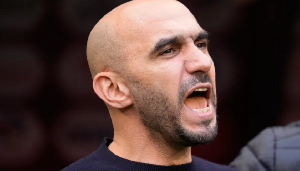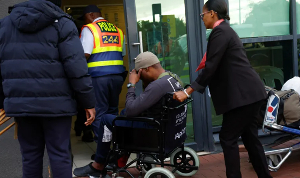November 27, 2010
The year 2007 was the nation’s “Jubilee Year”. Ghana was at long last celebrating its fiftieth birthday. A critical look the Nation’s fifty-three year history offers an opportunity to take stock of our past. On March 6th.1957 we took control of our country and were no longer going to be subjected to the “masters” dictates. Ghanaians were now in charge of the county and we should be treated with respect and dignity, individually and as a nation, so we believed. The Gold Coast gained its Independence from Great Britain and those of us, who were old enough, remember how we celebrated the occasion with all sorts of pomp and pageantry. This was the first country in Sub-Saharan Africa to gain its independence from colonial rule after the Second World War and the eyes of the world were on Ghana.
Our Expectations:
The future looked bright so we thought, but our history over the last fifty-three years teaches otherwise. The country had been politically decolonized but it turned out to be that the minds of its people and especially the minds of those new leaders were not yet decolonized on that date. Decolonization of the Ghanaian Mind did not happen on March 6th. 1957 and is yet to happen any time soon.
Ghanaians had become masters of our destiny, so we thought. A review of the fifty-three year history however indicates that we have really never been the masters of our national destiny and we may never be, until we decolonize our minds individually and collectively as a nation. Our colonial masters did not come to our shores to build a nation. They came primarily for the economic interest of the monarchy. Any other stated objectives were ancillary to the main objective.
The New “Masters”
Contrary to the hopes and aspirations of the citizen, our politicians and the technocrats who took over the affairs of the new nation, did not envisioned themselves as servants of the people. They became the replacement of the “White Master”. Indeed they did behave and acted like the “Colonial Master”. “The white man has now gone and we are in charge of your destiny and we demand all the respect and privileges accorded the Master!” seemed to be the message of the new leaders. This was what our new leaders indirectly said to the people of the new nation by their actions, practices, policies and politics.
Instead of developing and instituting systems of government that took into consideration the cultural and the traditional values, the new leadership chose the status quo. They therefore accorded to themselves all the privileges of the “Whiteman”. They demanded and got the bungalows, official cars, the drivers, garden boys, house maids and the “watchmen. These were Ghanaian men and women but the mentality was that of the “Colonial Masters”. This attitude, I believe has been and continues to be the biggest impediment to the future development of this nation. Ghana had been politically decolonized but the minds of its leaders and the population at large is yet to be decolonized. The foundation on upon which this nation was built was flawed and weak as evident by the major events of the immediate past years.
Major Events: These included; our immature approach to partisan politics that eventually lead to a One-Party State, our direct involvement in the ideological wars between the Western and the Eastern Block, the Preventative Detention Act under which political opponents and citizens were arrested and detained indefinitely, the assassination attempt on the President at Kulungugu, the collapse of the national economy and the eventual CIA sponsored overthrow of Dr. Kwame Nkrumah’s government in 1966.
After fifty-three years of Independence, Ghana is still materially dependent on the charities of our former colonial masters (Our Development Partners) to finance a substantial portion of the national budget. How can we claim to be masters of our destiny after such an appalling mismanagement of the economy? The continued dependency on others (Development Partners) for our national destiny points to a bleak Centenary Anniversary in 2057. Yes, you and I will certainly not be around then, but our grand and great-grand children will be the celebrants. What will they say about the national inheritance we had banqueted to them?
A Ghanaian Government:
Instead of systematically developing a model of government that was uniquely Ghanaian, we continued the colonial model of government which did not have nation building as its objective. As a people, we have never had any experience in Nation Building. We only continue to operate on the colonial governance that was in place at independence and we are yet to develop the new systems of governance required to build a just and sovereign nation.
Did we miss the boat?
On hind sight, the post Independence Government of Dr. Kwame Nkrumah had the best opportunity to restructure institutions such as the Civil Service, the military and other Security Agencies for “Nation Building” roles. However, our political history indicates that the post colonial administration had its own agenda for the use of these institutions. After independence, party politics infected these agencies including our military and security apparatus and were used for non- military purposes. The same colonially structured military and security systems which we did not restructure at independence were the instrument use to topple Dr. Nkrumah’s government.
The decolonization of the Ghanaian mind should have started immediately after independence starting with the armed forces, the security agencies and the civil service to reflect that of a national service. All able body Ghanaians should have been drafted into a national service where we could have undergone basic military, technical and other professional training for about two years. In order words the armed forces and security services could have been turned into a national service.
This was done in Costa Rica at independence and there has not been a single coup de tat in that country since 1949. But our post independence leaders for reasons best known to them elected to retain the colonially structured armed force. It chose rather to use the armed forces for purposes other than nation building and the protection of the new nation. We got involved in Freedom Fighting duties beyond our national boarders.
Fighting for Freedom: There was nothing inherently wrong with encouraging and helping freedom fighters across the continent at the time of our independence. The direct use of our armed forces in others conflicts, especially our involvement in the Congo, was the beginning of the Western conspiracy to destabilize Dr. Kwame Nkrumah’s government. We got our country caught between two fighting elephants and the little ant that Ghana was, got trampled on. Our direct involvement in ideologically wars between two super powers started the CIA conspiracy that eventually led to the overthrow of the CPP government in 1966.
National Sovereignty:
The direct involvement in external conflicts, I believe were the beginning of the end to our desired goal of building a sovereign nation. After coups and counter coups, Ghana at fifty-three is incapable of managing its national economy without a helping hand from the hands that raped and plundered the nation’s wealth. This country is unbelievably blessed with untapped natural and human resources, a perquisite for building a modern nation in less than fifty years. A nation that is not self-sufficient in food production, incapable of providing relevant basic education and health care services cannot claim to be master of its destiny.
After fifty-three years of independence, Ghana is technically a “Failed State” because we have not developed the relevant institutions to take control of our national economy. A critical look at the current municipal, local and district government systems it appears that there are no competent bodies managing these localities. Every one of these administration looks to Accra (Central Government) for directions and decisions. The Central Government in Accra since independence has proven to be incompetent and ineffective. The residents of the municipalities and the districts should own the governments not the Central Government. The Executives who manage the affairs of these localities should owe their allegiance to the residents not to the party in Accra. These people should be elected by the residents and not appointed by any political party bosses in Accra.
The next forty-seven years of this nation’s history will not be any better than the past fifty-three if we remain mentally colonized. Most of the basic national institutions are operating on a colonial models, policies and procedures. Our fifty-three year history is enough to teach us that the colonially structured institutions which we inherited have failed and will never work without decolonizing the minds. We need structures that will define what our “National Interest” should be. The colonially structured institutions such as the armed forces, the security services, the Civil Service, the education systems and the failed “Central Government” models need to be restructured to fit the country’s national interest, aspirations and development agenda. These aspirations, I believe are implicitly embedded in our national motto “Freedom and Justices”.
The Need for armed forces:
Sovereign nations have to have some form of armed force, but what should the size and purpose of that force be? The history of most African nations does indicate the need to restructuring of the armed forces. The restructuring could be done in ways that the institution becomes part of a national service (nation building and defense) models. I am not advocating for the elimination of the armed forces. I am advocating for making the institution better and relevant to the current development needs of our society. I would want to see an institution that provides military, professional, technical and technological training that could be useful to the private sector. I am advocating for the kind of training that earns our commissioned and non-commissioned officers respectable incomes many years after the retirement age.
The Civil Service: The current civil service needs to be totally restructured if the leaders of Ghana entertain any notion of becoming a player in the affairs of the global village. Our Civil Service as an institution of service should be restructured to bring some accountability and efficiency executive branch of Government. The Civil Service General Orders, which are the basic rules and procedures, need to be decolonized and the excessive political interferences drastically reduced. The service it appears is not accountable to the citizenry. Productivity and performance measures seem to be nonexistent in our Civil Service. Are the tax-paying citizens getting the desired services they pay for?
What is the future cost of not restructuring the bureaucracy? The cost to the current economy is rather huge and that on future development will be even greater. The excuse that this country is poor and therefore cannot afford the types of restructuring needed for the future development of this country is rather a lame one. We as a nation are poor only in progressive, visionary and innovative thinking. Any person who thinks that the next forty-seven years of our history will be any better under current colonially structured institutions should have his or her head examined. This current bureaucracy is the biggest impediment to the future development of Ghana. Decolonizing our collective mind will entail a redefinition of the purposes of the government. It will require selfless, patriotic and a progressive crop of leadership never seen before in this country.
Starting the Decolonization of the mind:
Successive government (military and civilian) have promised the people everything on and under the earth, sometimes on the sun and the moon just to get the vote and acceptance. We the people have also developed a culture of dependency and think that the government has the answer to all problems. The Government should provide us with jobs, bungalows, car and fuel allowances, free medical services and subsidized utility services. Who do we think is responsible for paying all these freebies? The workers, who probably earn less than three thousand Ghana Cedis (GH¢3,000) annually pay for our freebies.
Instead of asking the Government for the bungalow or free housing that I will have to vacate at the end of my working years, I would rather want a mortgage guarantee that would allow me to own my house where I could live with dignity at the end of my working days. The Government should not give me a free car but create an environment where on the basis of my income I can afford an employer guaranteed car loan from the commercial bank. At the end of my service to the people of Ghana, I would own both the house and the car. I should be making the decisions regarding the size of the house to own and the type of car to drive. We the citizens should own the government and be served by the civil service not the other way round. We the people should learn to do things for ourselves instead always demanding everything from the government. The more we demand from government the more the government would continue to control and own our collective and individual destiny.
Decolonizing the mind of the people will eventually produce leaders with more selfless and better understanding of what it takes to build a Sovereign Nation. This process will also entail the building of efficient and responsive bureaucracy. The level of revenues and other resources of a sovereign nation should drive the size of the government. Unfortunately just as it was in the colonial days the “Master” decided the amount that the colonial treasury needed to rule the colony, the citizens were taxed according to the “Master’s wishes.
The inefficiencies and the lack of performance measures in the bureaucracy and the size of Government has conspired to taxing the Ghanaian income earners into perpetual poverty. Successive administrations (military and civilian) have paid lip service to poverty alleviation since independence and we have nothing to show for the efforts. The so called “Development Partners” through their numerous Non-Governmental Organizations (NGOs) have been on the bandwagon for poverty alleviation in Africa and Ghana. Like most externally developed policies and programs the results are predictable: Nothing but Failures and failures after Decades after grants and loan programs. It is most likely that the wrong diagnosis have been imposed and recommended prescriptions are wrong as well. We have the means to alleviate poverty in Africa diagnosis and prescriptions. But we must first: “A Decolonized The Mind”.
Opinions of Monday, 28 November 2011
Columnist: Wood, Kwesi E.
Decolonizing the mind of a Nation
Entertainment













